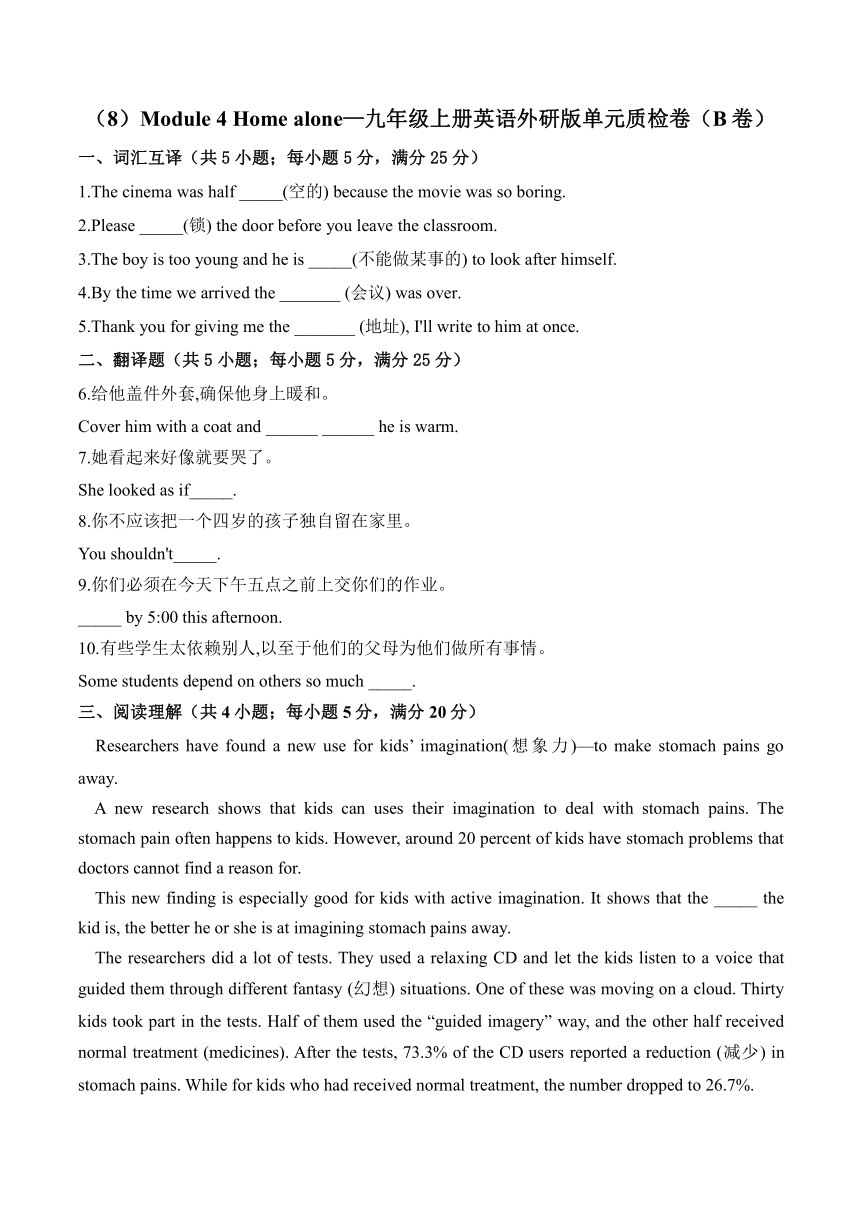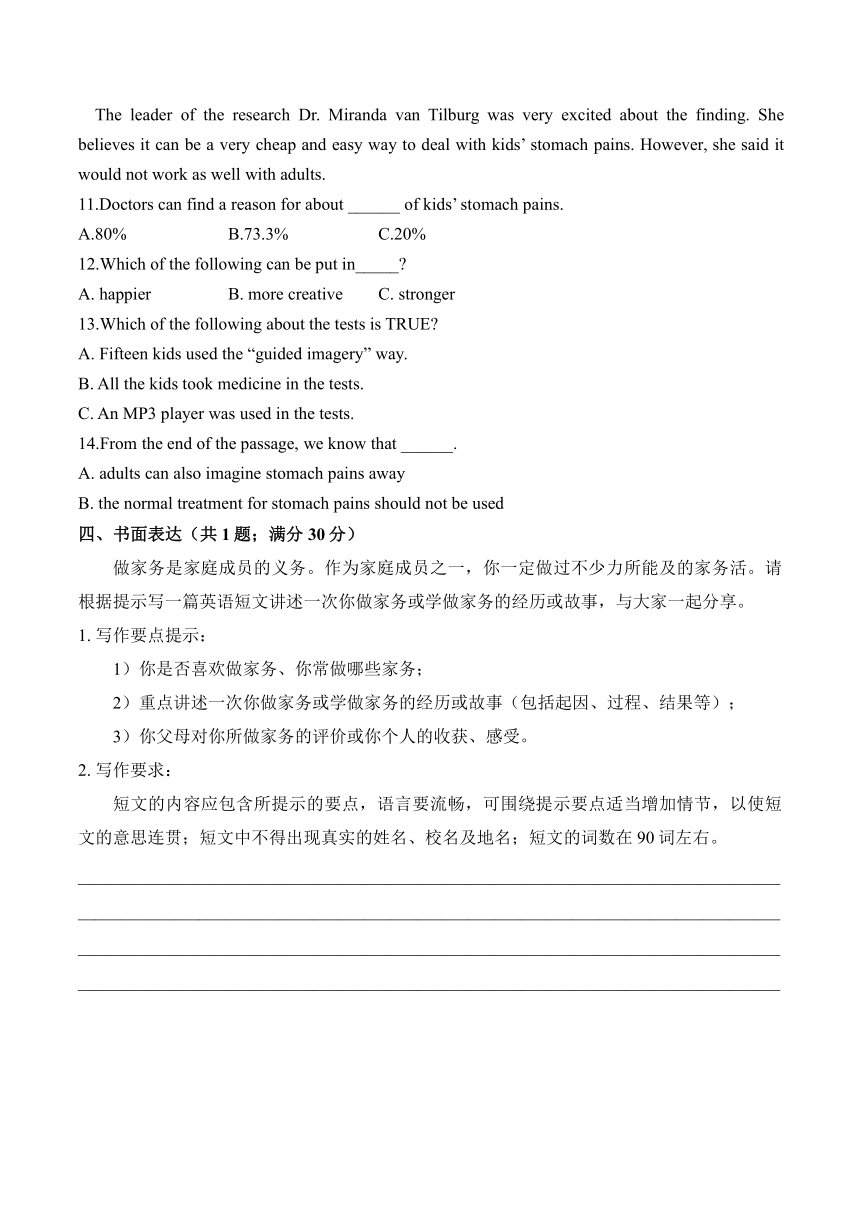外研版九年级上册Module 4 Home alone 单元质检卷(B卷)(含答案)
文档属性
| 名称 | 外研版九年级上册Module 4 Home alone 单元质检卷(B卷)(含答案) |

|
|
| 格式 | docx | ||
| 文件大小 | 20.7KB | ||
| 资源类型 | 教案 | ||
| 版本资源 | 外研版 | ||
| 科目 | 英语 | ||
| 更新时间 | 2024-09-29 14:33:47 | ||
图片预览


文档简介
(8)Module 4 Home alone—九年级上册英语外研版单元质检卷(B卷)
一、词汇互译(共5小题;每小题5分,满分25分)
1.The cinema was half _____(空的) because the movie was so boring.
2.Please _____(锁) the door before you leave the classroom.
3.The boy is too young and he is _____(不能做某事的) to look after himself.
4.By the time we arrived the _______ (会议) was over.
5.Thank you for giving me the _______ (地址), I'll write to him at once.
二、翻译题(共5小题;每小题5分,满分25分)
6.给他盖件外套,确保他身上暖和。
Cover him with a coat and ______ ______ he is warm.
7.她看起来好像就要哭了。
She looked as if_____.
8.你不应该把一个四岁的孩子独自留在家里。
You shouldn't_____.
9.你们必须在今天下午五点之前上交你们的作业。
_____ by 5:00 this afternoon.
10.有些学生太依赖别人,以至于他们的父母为他们做所有事情。
Some students depend on others so much _____.
三、阅读理解(共4小题;每小题5分,满分20分)
Researchers have found a new use for kids’ imagination(想象力)—to make stomach pains go away.
A new research shows that kids can uses their imagination to deal with stomach pains. The stomach pain often happens to kids. However, around 20 percent of kids have stomach problems that doctors cannot find a reason for.
This new finding is especially good for kids with active imagination. It shows that the _____ the kid is, the better he or she is at imagining stomach pains away.
The researchers did a lot of tests. They used a relaxing CD and let the kids listen to a voice that guided them through different fantasy (幻想) situations. One of these was moving on a cloud. Thirty kids took part in the tests. Half of them used the “guided imagery” way, and the other half received normal treatment (medicines). After the tests, 73.3% of the CD users reported a reduction (减少) in stomach pains. While for kids who had received normal treatment, the number dropped to 26.7%.
The leader of the research Dr. Miranda van Tilburg was very excited about the finding. She believes it can be a very cheap and easy way to deal with kids’ stomach pains. However, she said it would not work as well with adults.
11.Doctors can find a reason for about ______ of kids’ stomach pains.
A.80% B.73.3% C.20%
12.Which of the following can be put in_____
A. happier B. more creative C. stronger
13.Which of the following about the tests is TRUE
A. Fifteen kids used the “guided imagery” way.
B. All the kids took medicine in the tests.
C. An MP3 player was used in the tests.
14.From the end of the passage, we know that ______.
A. adults can also imagine stomach pains away
B. the normal treatment for stomach pains should not be used
四、书面表达(共1题;满分30分)
做家务是家庭成员的义务。作为家庭成员之一,你一定做过不少力所能及的家务活。请根据提示写一篇英语短文讲述一次你做家务或学做家务的经历或故事,与大家一起分享。
1. 写作要点提示:
1)你是否喜欢做家务、你常做哪些家务;
2)重点讲述一次你做家务或学做家务的经历或故事(包括起因、过程、结果等);
3)你父母对你所做家务的评价或你个人的收获、感受。
2. 写作要求:
短文的内容应包含所提示的要点,语言要流畅,可围绕提示要点适当增加情节,以使短文的意思连贯;短文中不得出现真实的姓名、校名及地名;短文的词数在90词左右。
_________________________________________________________________________________
_________________________________________________________________________________
_________________________________________________________________________________
_________________________________________________________________________________
答案以及解析
一、词汇互译
1.答案:empty
2.答案:lock
3.答案:unable
4.答案:meeting
5.答案:address
二、翻译题
6.答案:make sure
7.答案:she was about to cry
8.答案:leave a four-year-old child alone at home
9.答案:You must hand in your homework/hand your homework in
10.答案:that their parents do everything for them
三、阅读理解
11.答案: A.
解析:本小题考查学生理解具体信息和简单计算的能力。由第二段最后一句可知对于20%的胃病,医生找不到原因,也就是说对于另外80%来说,可以找到原因。
12.答案: B.
解析:本小题考查学生推理判断的能力。由该段第一句…for kids with active imagination可知“丰富的”想象力对治疗胃痛有帮助,creative意思是“有创造力的”,有创造力的孩子思维更活跃,因此选B。
13.答案: A.
解析:本小题考查学生理解具体信息的能力。由第四段第四、五句可知有30名儿童参与实验,其中有一半(也就是15人)使用guided imagery方法。
14.答案: C.
解析:本小题考查学生理解具体信息的能力。由最后一段可知Miranda博士很肯定这项研究成果,她认为想象力是一种比较简单且价格低廉的应对儿童胃痛的方法。
四、书面表达
Do you like doing housework I like doing housework. I will help my mother do housework when I am free. Because I think parents are very tired after a day’s work. I want them to have a good rest. I often help clean room, wash dishes, take away the rubbish and so on.
Last Sunday, my mother was on duty. She must go home late. So I wanted to try to make dinner. I boiled some noodles first. Then I cut up some tomatoes and broke two eggs. Put them into the noodles. When my mother came back home, I had already made two bowls of noodles with tomato and eggs. My mother was surprised and happy. She praised me. I was happy, too.
一、词汇互译(共5小题;每小题5分,满分25分)
1.The cinema was half _____(空的) because the movie was so boring.
2.Please _____(锁) the door before you leave the classroom.
3.The boy is too young and he is _____(不能做某事的) to look after himself.
4.By the time we arrived the _______ (会议) was over.
5.Thank you for giving me the _______ (地址), I'll write to him at once.
二、翻译题(共5小题;每小题5分,满分25分)
6.给他盖件外套,确保他身上暖和。
Cover him with a coat and ______ ______ he is warm.
7.她看起来好像就要哭了。
She looked as if_____.
8.你不应该把一个四岁的孩子独自留在家里。
You shouldn't_____.
9.你们必须在今天下午五点之前上交你们的作业。
_____ by 5:00 this afternoon.
10.有些学生太依赖别人,以至于他们的父母为他们做所有事情。
Some students depend on others so much _____.
三、阅读理解(共4小题;每小题5分,满分20分)
Researchers have found a new use for kids’ imagination(想象力)—to make stomach pains go away.
A new research shows that kids can uses their imagination to deal with stomach pains. The stomach pain often happens to kids. However, around 20 percent of kids have stomach problems that doctors cannot find a reason for.
This new finding is especially good for kids with active imagination. It shows that the _____ the kid is, the better he or she is at imagining stomach pains away.
The researchers did a lot of tests. They used a relaxing CD and let the kids listen to a voice that guided them through different fantasy (幻想) situations. One of these was moving on a cloud. Thirty kids took part in the tests. Half of them used the “guided imagery” way, and the other half received normal treatment (medicines). After the tests, 73.3% of the CD users reported a reduction (减少) in stomach pains. While for kids who had received normal treatment, the number dropped to 26.7%.
The leader of the research Dr. Miranda van Tilburg was very excited about the finding. She believes it can be a very cheap and easy way to deal with kids’ stomach pains. However, she said it would not work as well with adults.
11.Doctors can find a reason for about ______ of kids’ stomach pains.
A.80% B.73.3% C.20%
12.Which of the following can be put in_____
A. happier B. more creative C. stronger
13.Which of the following about the tests is TRUE
A. Fifteen kids used the “guided imagery” way.
B. All the kids took medicine in the tests.
C. An MP3 player was used in the tests.
14.From the end of the passage, we know that ______.
A. adults can also imagine stomach pains away
B. the normal treatment for stomach pains should not be used
四、书面表达(共1题;满分30分)
做家务是家庭成员的义务。作为家庭成员之一,你一定做过不少力所能及的家务活。请根据提示写一篇英语短文讲述一次你做家务或学做家务的经历或故事,与大家一起分享。
1. 写作要点提示:
1)你是否喜欢做家务、你常做哪些家务;
2)重点讲述一次你做家务或学做家务的经历或故事(包括起因、过程、结果等);
3)你父母对你所做家务的评价或你个人的收获、感受。
2. 写作要求:
短文的内容应包含所提示的要点,语言要流畅,可围绕提示要点适当增加情节,以使短文的意思连贯;短文中不得出现真实的姓名、校名及地名;短文的词数在90词左右。
_________________________________________________________________________________
_________________________________________________________________________________
_________________________________________________________________________________
_________________________________________________________________________________
答案以及解析
一、词汇互译
1.答案:empty
2.答案:lock
3.答案:unable
4.答案:meeting
5.答案:address
二、翻译题
6.答案:make sure
7.答案:she was about to cry
8.答案:leave a four-year-old child alone at home
9.答案:You must hand in your homework/hand your homework in
10.答案:that their parents do everything for them
三、阅读理解
11.答案: A.
解析:本小题考查学生理解具体信息和简单计算的能力。由第二段最后一句可知对于20%的胃病,医生找不到原因,也就是说对于另外80%来说,可以找到原因。
12.答案: B.
解析:本小题考查学生推理判断的能力。由该段第一句…for kids with active imagination可知“丰富的”想象力对治疗胃痛有帮助,creative意思是“有创造力的”,有创造力的孩子思维更活跃,因此选B。
13.答案: A.
解析:本小题考查学生理解具体信息的能力。由第四段第四、五句可知有30名儿童参与实验,其中有一半(也就是15人)使用guided imagery方法。
14.答案: C.
解析:本小题考查学生理解具体信息的能力。由最后一段可知Miranda博士很肯定这项研究成果,她认为想象力是一种比较简单且价格低廉的应对儿童胃痛的方法。
四、书面表达
Do you like doing housework I like doing housework. I will help my mother do housework when I am free. Because I think parents are very tired after a day’s work. I want them to have a good rest. I often help clean room, wash dishes, take away the rubbish and so on.
Last Sunday, my mother was on duty. She must go home late. So I wanted to try to make dinner. I boiled some noodles first. Then I cut up some tomatoes and broke two eggs. Put them into the noodles. When my mother came back home, I had already made two bowls of noodles with tomato and eggs. My mother was surprised and happy. She praised me. I was happy, too.
同课章节目录
- Module 1 Wonders of the world
- Unit 1 It's more than 2,000 years old.
- Unit 2 The Grand Canyon was not just big.
- Unit 3 Language in use
- Module 2 Public holidays
- Unit 1 My family always go somewhere interesting a
- Unit 2 We have celebrated the festival since the f
- Unit 3 Language in use
- Module 3 Heroes
- Unit 1 She trained hard,so she became a great play
- Unit 2There were few doctors, so he had to work ve
- Unit 3 Language in use
- Module 4 Home alone
- Unit 1 I can look after myself, although it won’t
- Unit 2 I became so bored with their orders that I
- Unit 3 Language in use
- Module 5 Museums
- Unit 1 Don't cross that rope!
- Unit 2 If you ever go to London, make sure you vis
- Unit 3 Language in use
- Module 6 Problems
- Unit 1 If I start after dinner, I'll finish it be
- Unit 2 If you tell him the truth now, you will sho
- Unit 3 Language in use
- Revision Module A
- Module 7 Great books
- Unit 1 We're still influenced by Confucius's idea
- Unit 2 It is still read and loved.
- Unit 3 Language in use
- Module 8 Sports life
- Unit 1 Daming wasn't chosen for the team last time
- Unit 2 He was invited to competitions around the w
- Unit 3 Language in use
- Module 9 Great inventions
- Unit 1 Will computers be used more than books in t
- Unit 2 Will books be replaced by the Internet?
- Unit 3 Language in use
- Module 10 Australia
- Unit 1 I have some photos that I took in Australia
- Unit 2 The game that they like most is Australian
- Unit 3 Language in use
- Module 11 Photos
- Unit 1 He's the boy who won the photo competition
- Unit 2 The photo which we liked best was taken by
- Unit 3 Language in use
- Module 12 Save our world
- Unit 1 If everyone starts to do something, the wor
- Unit 2 Repeat these three words daily: reduce, reu
- Unit 3 Language in use
- Revision Module B
